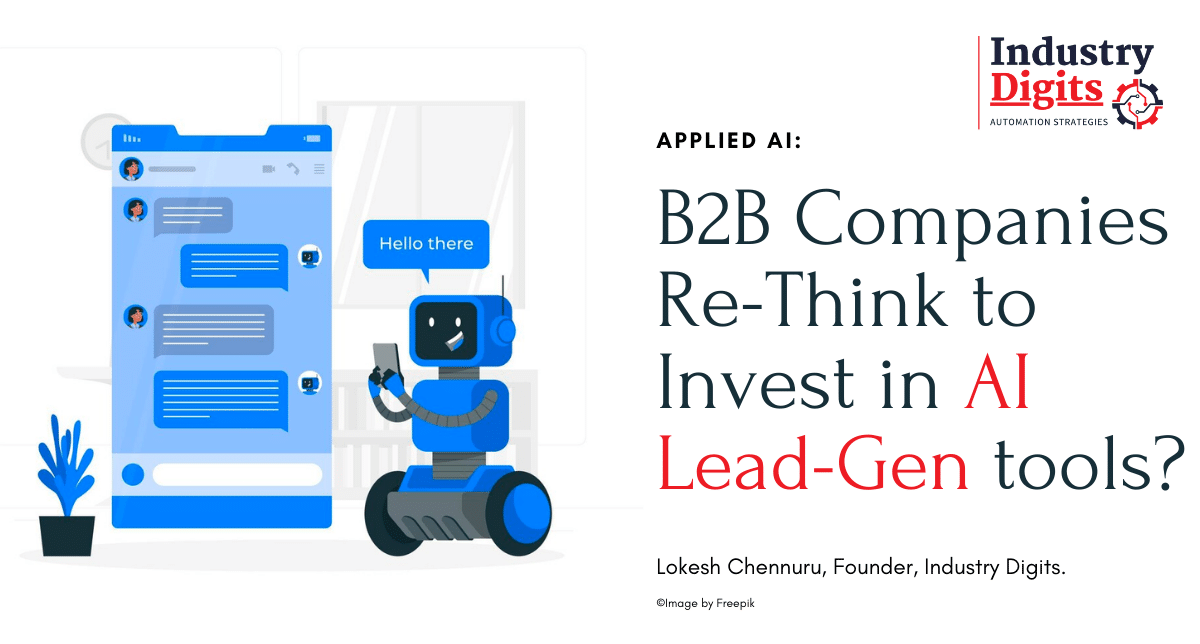Unlock Performance and Development With AI Automation for B2B Companies
AI automation is transforming the landscape for B2B business. It decreases and streamlines procedures reliance on human treatment. This shift permits organizations to make quicker, data-driven decisions. As organizations discover which processes to automate, they should additionally take into consideration the right devices to implement. Obstacles stay in embracing AI technology. The effects of these changes could form the future of numerous business in methods yet to be totally recognized.
Recognizing AI Automation in the B2B Context
As organizations progressively seek effectiveness, recognizing AI automation in the B2B context comes to be essential. AI automation entails utilizing innovative technologies to enhance operations, decrease human intervention, and boost decision-making processes. In the B2B landscape, this can manifest in various kinds, such as automating client service communications, taking care of supply chain logistics, or optimizing advertising and marketing campaigns. Companies can take advantage of AI to assess substantial datasets rapidly, allowing them to recognize patterns and understandings that notify strategic selections. Additionally, AI systems can incorporate effortlessly with existing modern technologies, supplying a natural platform for taking care of service features. This understanding prepares for companies to discover how AI can change their procedures, improve performance, and inevitably foster lasting development in a competitive market.
Trick Benefits of Carrying Out AI Automation

Recognizing Processes Appropriate for Automation
Just how can B2B firms effectively determine processes ideal for automation? A methodical technique starts with mapping out existing workflows to identify time-consuming and repetitive jobs. These tasks typically include information entry, invoicing, and customer follow-ups. Firms should assess the frequency and quantity of these procedures, as high-frequency jobs offer the best chance for performance gains. Additionally, examining the capacity for error decrease and source allowance can highlight areas ripe for automation. Engaging workers in conversations can likewise provide understandings into which processes hinder performance. Finally, business should think about the placement of automation with their calculated goals, guaranteeing that the recognized procedures add to overall service goals, eventually helping with smoother operations and boosted development.

Picking the Right AI Equipment for Your Service
When B2B business consider automating their processes, choosing the ideal AI devices becomes vital for accomplishing desired outcomes. Companies ought to begin by reviewing their one-of-a-kind demands and objectives, making sure placement with company objectives. Assessing the assimilation, flexibility, and scalability capabilities of potential tools is vital, as these aspects establish lasting effectiveness (Minarik AI). Organizations must also think about user-friendliness and the degree of support provided by suppliers, as these aspects can affect successful implementation. Additionally, analyzing consumer reviews and study can give insights into how specific AI remedies execute in real-world situations. By thoroughly selecting AI tools that fit their operational demands, B2B business can enhance effectiveness and drive growth while minimizing potential disruptions
Conquering Challenges in AI Adoption
B2B business frequently run into substantial challenges in adopting AI modern technologies, specifically problems associated with information top quality and resistance to transform monitoring. Poor information high quality can impede the performance of AI systems, while worker hesitation to embrace new procedures can stall implementation initiatives. Resolving these challenges is essential for successful AI integration and optimizing its potential benefits.
Information Top Quality Issues
Ensuring high data high quality is crucial for the effective fostering of AI technologies in business-to-business atmospheres. Incorrect, incomplete, or obsolete data can badly prevent AI efforts, resulting in erroneous insights and inadequate decision-making. Firms usually encounter challenges such as data silos, variances throughout different resources, and a lack of standard data layouts. To get over these problems, companies must invest in data cleansing, combination, and governance procedures (AI Automation For B2B). Carrying out robust data administration techniques assures that the info fed into AI systems is appropriate and reliable. Furthermore, promoting a society of data quality understanding amongst workers can enhance information accuracy with time. By attending to information quality issues, B2B business can launch the full capacity of AI automation, driving performance and growth
Change Monitoring Resistance
Getting rid of change monitoring resistance is crucial for the effective application of AI efforts within companies. Staff members often exhibit suspicion in the direction of AI, being afraid work displacement or modifications to established workflows. To fight this, leadership must foster a society of visibility and continual learning. Providing training and clear interaction regarding the advantages of AI can minimize problems and build count on. Involving workers in the shift procedure motivates collaboration and minimizes resistance. Identifying change champs within groups can promote smoother acceptance of AI innovations. As companies navigate this change, dealing with useful and emotional concerns associated with AI adoption ends up being crucial for making best use of the modern technology's potential and guaranteeing a smooth integration right into existing procedures.
Determining the Influence of AI Automation
Gauging the influence of AI automation in B2B firms needs a clear understanding of essential performance signs (KPIs) that align with company purposes. Effective information evaluation strategies are vital for analyzing the outcomes, while durable ROI assessment methods aid identify the economic advantages of automation initiatives. Together, these elements offer a comprehensive framework for reviewing AI's contributions to business success.
Secret Efficiency Indicators
Trick performance indicators (KPIs) serve as vital devices for B2B companies to examine the effectiveness of AI automation initiatives. By developing clear metrics, organizations can gauge improvements in functional effectiveness, price reduction, and earnings growth straight attributable to automation. Typical KPIs consist of cycle time decrease, mistake prices, consumer complete satisfaction scores, and worker efficiency degrees. These indications supply insights right into exactly how AI systems are optimizing processes and boosting general performance. Furthermore, tracking KPIs makes it possible for business to determine areas for more renovation and to straighten AI automation initiatives with critical company goals. Eventually, a well-defined framework of KPIs warranties that B2B companies can quantitatively assess the impact of AI automation on their procedures and drive continual development.
Information Evaluation Methods
Reliable information analysis strategies play an important role in assessing the effect of AI automation within B2B companies. By using statistical methods, companies can determine fads and patterns in functional information, permitting them to evaluate the effectiveness gains achieved via automation. Methods such as regression analysis and time series projecting give understandings into exactly how AI-driven procedures influence productivity and decision-making. Minarik AI. In addition, data visualization devices can properly connect findings to stakeholders, assisting in notified critical choices. Artificial intelligence algorithms can additionally boost analysis by predicting future end results based upon historical information, supplying actionable insights. Eventually, these strategies allow B2B firms to measure success and blog optimize their AI automation campaigns, making sure alignment with service goals and enhancing general efficiency
ROI Evaluation Techniques
Reviewing the return on financial investment (ROI) of AI automation is vital for B2B business seeking to recognize the economic ramifications of their technical campaigns. Companies can employ various ROI evaluation approaches to gauge the effectiveness of AI implementations. One reliable approach involves computing cost financial savings by contrasting operational expenditures before and after automation. Furthermore, determining productivity enhancements through essential efficiency signs (KPIs) helps measure the advantages of AI. Customer satisfaction metrics can likewise supply insights into the impact of automation on solution top quality. To ensure an extensive assessment, business must think about both direct economic returns and intangible benefits, such as enhanced decision-making abilities and affordable benefit. This complex examination enables B2B companies to make educated decisions concerning future financial investments in AI innovation.
Future Trends in AI Automation for B2B Firms
What technologies exist ahead for AI automation in B2B companies? Arising patterns show a significant change towards improved data analytics capacities, enabling companies to make more enlightened decisions (Growth Systems For B2B). Anticipating analytics will certainly become significantly vital, enabling firms to prepare for market changes and customer requirements. Furthermore, the combination of AI with Net of Points (IoT) innovation is anticipated to simplify procedures by offering real-time understandings and automation of procedures. Firms will additionally concentrate on boosting consumer experiences through personalized marketing driven by AI formulas. Improvements in all-natural language processing will certainly help with much better communication between organizations and clients. As these fads evolve, B2B business should adjust to take advantage of AI automation efficiently, guaranteeing continual development and affordable benefit
Often Asked Inquiries
What Industries Benefit the Most From AI Automation in B2B?
Manufacturing, financing, medical care, and logistics sectors profit one of the most from AI automation in B2B. These industries utilize AI to enhance processes, boost decision-making, and boost general operational performance, driving substantial development and advancement.
How Does AI Automation Influence Staff Member Roles and Responsibilities?
AI automation reshapes employee roles and duties by improving repetitive jobs, enabling employees to concentrate on calculated initiatives. This change fosters skill growth, improves efficiency, and urges cooperation, eventually driving business development and advancement.
What Prevail Misconceptions Concerning AI Automation in B2B?
Typical misconceptions about AI automation in B2B consist of worries of work loss, ideas that AI can completely change human judgment, and ignoring the value of partnership between AI systems and workers for excellent results. - Minarik AI
How Can Companies Make Sure Data Personal Privacy With AI Automation?
Companies can guarantee data personal privacy with AI automation by executing robust file encryption methods, sticking to regulative conformity, performing routine audits, and training employees on data handling practices to reduce dangers and protect sensitive information. (AI Automation For B2B)
What Are the Prices Related To Carrying Out AI Automation?
The costs related to carrying out AI automation include software program purchase, framework upgrades, training employees, recurring maintenance, and prospective downtime throughout integration. Furthermore, firms may incur expenditures connected to information protection and compliance measures.
Determining the effect of AI automation in B2B firms calls for a clear understanding of essential efficiency indications (KPIs) that straighten with business goals. Key efficiency indications (KPIs) offer as crucial tools for B2B companies to analyze the efficiency of AI automation campaigns. Efficient information analysis strategies play an important duty in assessing the influence of AI automation within B2B business. Assessing the return on financial investment (ROI) of AI automation is necessary for B2B firms seeking to recognize the monetary implications of their technical efforts. What developments exist in advance for AI automation in B2B firms?